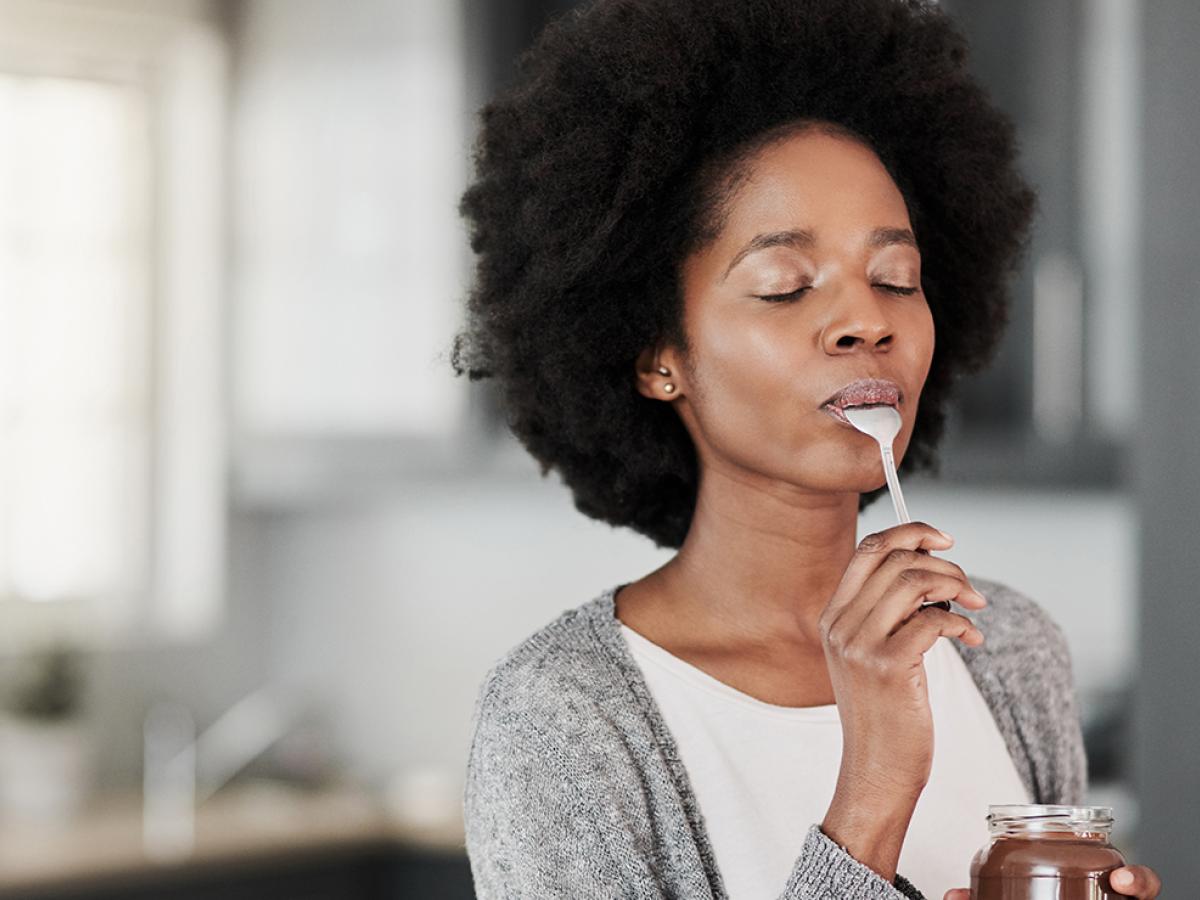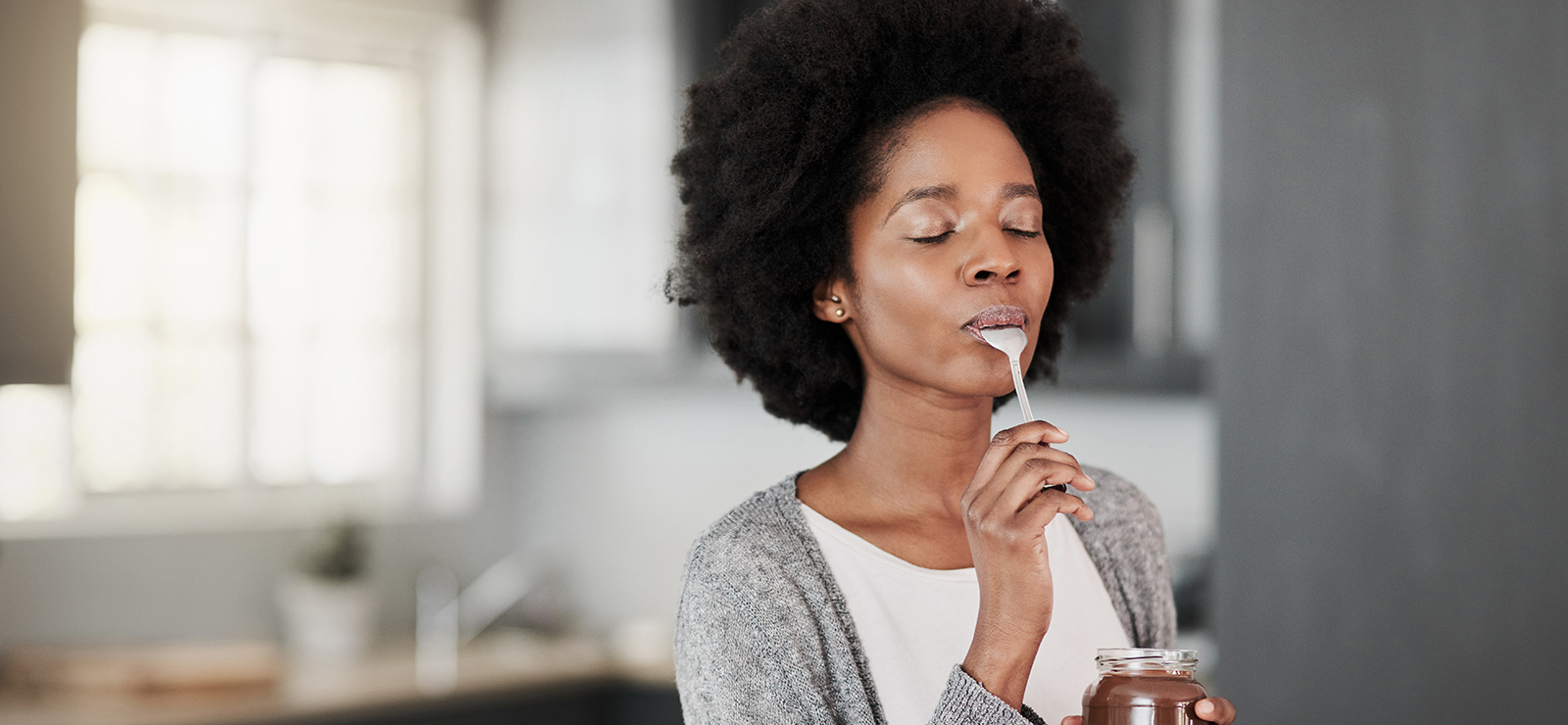July 23, 2025

We’ve all been there: You see a muffin at the grocery store or a commercial for a cheeseburger, and now it’s all you can think about. You’re not necessarily hungry — no matter what you tell yourself. You’re just having a craving.
As many as 97% of women and 68% of men report having a craving at least once in their lifetimes. But it’s not uncommon to have cravings multiple times a week. Nearly 85% of craving episodes result in eating the desired food or something very similar.
“Cravings are more complex than they seem,” says Megan Walenda, a registered dietitian nutritionist at MU Health Care’s Weight Management and Metabolic Center. “They often involve brain messages, hormonal responses, habitual behaviors and access to desirable food.”
While some may think a craving is their body telling them they need a certain nutrient, such as iron or calcium, nutritional deficiencies very rarely cause cravings. More likely, your cravings is triggered by:
- Emotions, when you’re hoping a certain food will change your mood
- Environment, if you suddenly encounter a pleasurable food (or see one in the media)
- Habitual behavior, or connecting a particular food to an event
- Hormones, which can impact your feelings of pleasure and fullness
- Physiological changes, such as the increased saliva flow that happens when you see or smell a desirable food
- Pregnancy, which can heighten your senses of smell and taste
No matter what’s behind your craving, taking a moment to be mindful may help you stop it in its tracks. Next time you yearn for a specific food, Walenda suggests asking yourself some questions to get to the root of your craving.
1. When Do I Typically Have Cravings?
Identifying patterns in your cravings can be the key to understanding why you are having them, Walenda says. For many women, the answer has to do with sex hormones.
Cravings often align with your menstrual cycle for several reasons, including:
- Blood glucose (sugar) levels: Research shows positive associations between food cravings and blood sugar. When your blood glucose is higher — which tends to happen right before your period — you’re more likely to experience cravings.
- Hormonal fluctuations: During the week before your period, your estrogen levels dip and your progesterone levels peak. The combination can cause increased cravings but leave you feeling less satisfied after eating.
The good news is that these hormone-related cravings only come once a month. Knowing that your craving is simply female hormones may be enough to help you resist the temptation.
2. Are My Cravings a Habit?
Having a craving at the same time every day may mean your craving has become a habit. Some studies show that food cravings can be a conditioned response. For instance, every time you sit to watch your show at night, you have a bowl of ice cream. Or maybe you grab a granola bar every day when you walk in from work. Whenever you sit down at night or arrive home after a long day, you crave that snack.
“When a craving becomes a habit, you begin to associate the food with that feel-good activity,” Walenda says.
The good news is that learned responses can be unlearned, but it won’t be easy. Distract yourself during the time you usually have that craving. Fold wash as you watch TV or unwind after work with a walk around the block. The craving should subside after about a week.
3. Are My Meals Well-Balanced and Nutrient Dense?
If you typically crave food within an hour or two of eating, you may not be eating foods that keep you feeling full and satisfied.
“If you aren’t getting enough calories, your ‘craving’ might actually be hunger,” Walenda says. “Evaluate your last meal. Did you get enough protein and fiber to really satiate your body?”
Next time you get a craving shortly after a meal, drink a full glass of water to ensure you’re hydrated. Then, review what you ate at your previous meal. Try to plan meals that are nutritious and satisfying.
4. Am I Restricting Certain Foods?
There can be many reasons to restrict specific foods or food groups. Whether you have an allergy, the food causes digestive issues, or you are trying to lose weight, restriction can increase your desire for that food.
But when it comes to weight loss or general healthy eating behaviors, “Practicing restrictive behavior often increases our thoughts about the thing we’ve restricted,” Walenda says. “When we allow ourselves to thoughtfully indulge in foods we enjoy, it develops a healthy relationship with that food. That can help us meet our goals while also avoiding disordered eating patterns.”
In the meantime, make sure you are getting enough calories and that your meals are nutritious. Remind yourself every day why you are restricting the food.
5. Am I Chronically Stressed?
Acute stress often causes cravings and appetite to diminish. But chronic stress tends to increase cravings for some foods and the rewards they bring.
Eating certain foods — the ones thought to be enjoyable because they are sweet, salty or rich — can light up the reward area of the brain and cause a dopamine (pleasure hormone) response. As a result, the experience is positive and pleasurable, causing you to seek those foods again and again.
“Stress can lead to craving comfort food or meals high in sugar and fat,” Walenda says. “Those feel-good foods trigger that hormonal response.”
Next time you are feeling stressed and craving a brownie, do something else that increases your dopamine instead. Take a walk outside, watch a favorite movie, listen to music or call a friend.
6. How Am I Sleeping?
Getting enough quality sleep helps regulate metabolic functions. A lack of sleep — or a sleep-related issue — can cause an imbalance of digestive-related hormones, leading to more frequent food cravings and worse dietary choices. When you’re tired, you may find yourself craving quick-energy foods and quick carbohydrates, such as processed snack foods.
“When you are lacking quality sleep, you are more likely to give in to those whispers calling you to eat a certain food,” Walenda says. Instead, look to non-food ways to gain energy. Stay hydrated, engage in light exercise — outside in fresh air, if possible — and take short naps when needed throughout the day. Then, focus on improving your sleep habits.
7. Am I Bored?
Be honest. Are you looking for something to do, and eating that pizza, cookie or whatever is calling seems like a good option? Or does a trip to the kitchen to indulge that craving simply sound better than whatever you’re doing at the moment?
“Eating out of boredom is another example of your body looking for a dopamine response,” Walenda says. Craving a hyperpalatable food (one that tastes really good), such as soda, chips or chocolate, is a sure sign that you’re needing a boost of dopamine. “That’s when you want to look for a different activity that provides pleasure but moves your mind away from food.”
Take a walk outside, listen to a podcast or clean out a drawer — the sense of accomplishment can also boost dopamine. If you can distract yourself from eating for five to seven minutes, the craving may pass.
When to See a Medical Profession About Cravings
Cravings are normal and typically not a cause for concern. However, you may want to consult your primary care provider if you experience:
- Binging or eating whatever you crave to the point of being sick
- Desire to swallow things other than food, which may signal a mental health condition called pica
- Excessive cravings that you cannot control
For severe cases, there are medications available that help control cravings. If needed, your doctor can also refer you to a dietitian or another specialist if they suspect a sleep condition or hormonal imbalance.
Next Steps and Useful Resources
- Want to get started with a primary care provider? Find one today.
- Curious about our dietitian services? See what we have to offer.


